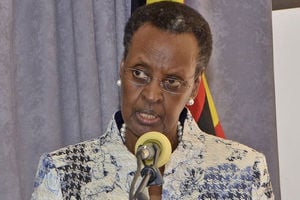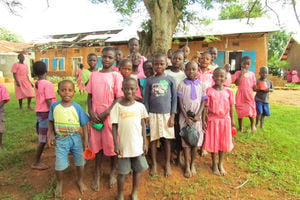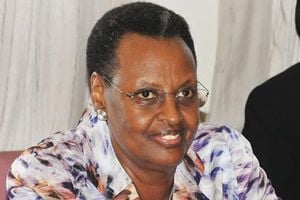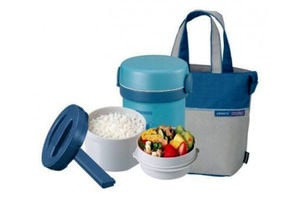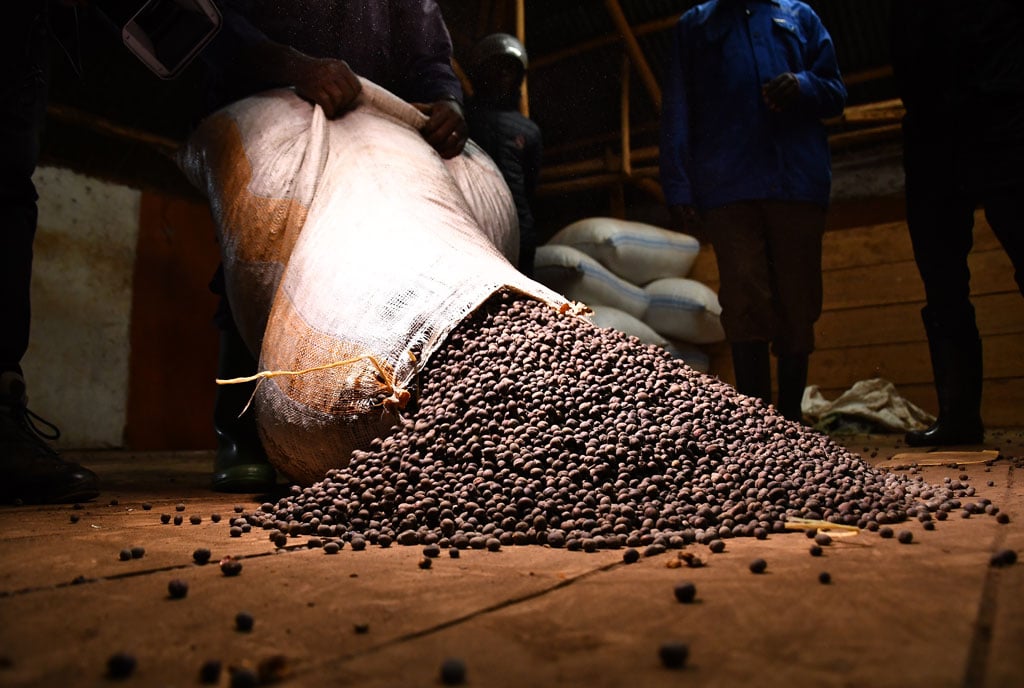
President Museveni (centre) and First Lady Janet Museveni (right) at the close of the Buganda Mother's Union in Luweero on September 1, 2024. PHOTO/COURTESY OF THE PRESIDENT'S X HANDLE
The Minister of Education and Sports has asked parents to pack at least two eggs and a bottle of milk for their school-going children.
Janet Museveni made the plea at the close of the Buganda Mothers Un-ion 2024 conference in Luweero on Sunday.
The First Lady, who was accompanied by President Museveni, said she be-lieves mothers can play a major role in ensuring children have lunch packs as they leave home for school.
Eggs, milk, and porridge
“…And so, many of those children drop out of school; that is why I’m now appealing to the mothers directly because I’m speaking to the mothers now. Every mother who has a child going to a Universal Education School must take the responsibility to ensure that their child will pack lunch to take to school, and that lunch can be a very simple lunch because it’s the responsibility of the mother to ensure that the child will not stay hungry the whole day. So, you can pack just two eggs, and maybe a bottle of milk,” the First Lady said amid hushed murmurs from the crowd.
President Museveni then quickly chipped in, suggesting the option of katoogo, a popular local mixed meal.
The First Lady then continued: “The message about parents acting responsibly and caring for their children is not new. I have shared the very message at different forums about the challenging circumstances that I went through while in exile but caring for the family. I carried the responsibility as a mother.
Ms Museveni said mothers who plan and pray for their families never fail to provide for the children, something she said would see the country have fewer teenage pregnancies and early marriages if they act responsibly.
The President then tasked the mothers to explain why they are failing to pack lunch for children. "Let one of you come and explain to me why we are faiing in this area," he said.
But one of the mothers, who introduced herself as a teacher, said many parents don't own land and may fail to get the food or a place to rear the cows, especially in central Uganda, where land ownership disputes are widespread.
But Mr Museveni quickly countered: “I understand the land problem, but this should not divert us from the real problem. You, the parents, have a variety of choices for ensuring the children have packed lunch. Even katooga can be packed."
Shared responsibility
Ms Museveni also said education of children should be a shared responsibility between the parents and the government. She said for a holistic upbringing of children, both the parents and the schools should play their respective roles.
“We have seen and toured the exhibition stalls where the mothers make the sanitary pads as enterprise projects, but the mother should be able to preserve some of the sanitary towels for the girl-child. It is terrible when your child drops out of school for lack of sanitary towels,” Ms Museveni said.
She said mothers should take the lead role in getting to know their children’s friends and teachers.
“By interacting with the children on a daily basis and getting to understand them better, the country will have responsible citizens. The policy of allowing the girls to go back to school after the pregnancy may not help the girl-child since many lose confidence, and may end up dropping out of school.
This message fits into the mission and objectives that define roles and responsibilities in a home and that of government,” she said.
Case of food flasks
This is not the first time that Ms Mu-seveni returns to the theme of packing food for school-going children. In 2016, the First Lady faced a backlash from the public when she criticized the packing of cold food for school-going children and advised parents to buy food flasks so that the pupils could eat food when it is still hot.
Whereas the above suggestion was made to ensure pupils could eat hot food instead of cold meals during school hours, the proposal sparked an uproar from many who said it was challenging to afford food flasks and the additional cost of providing hot meals daily.
A decent food flask costs between Shs20,000 and Shs50,000, which many said they could not afford, let alone finding what to pack in those flasks. The recommendation did not see the light of day.
New education policy
The President said by rolling out the Universal Primary Education (UPE) and Universal Secondary Education (USE) programs, the government intended to remove the sticky issue of school dropout.
“Our proposal is for day school for the UPE and the USE schools to address the challenge of school dropout. We can ask ourselves where the nine million children that would be getting to secondary school go. The parents are giving back responsibility to schools that end up charging the lunch fee, which becomes problematic,” he told the more than 500 mothers gathered at Timnah Primary School.
“With the day school, the children can go back home and get attended to by the parents. The parents have the responsibility of arranging for the lunch packs. The government will cater for infrastructure, including the classrooms, staff remuneration, and teachers' houses. Because you (Mothers Union) have grasped the poverty fight idea, go back and talk to the other citizens about this idea,” Museveni said.
Roles of parents
But the government has since drafted a new Universal Primary and Second-ary Education policy, outlining the roles of both the government and parents in providing for children's education.
The policy stipulates that while the government would provide basic school infrastructure and staff remuneration, the parents would be responsible for providing meals, uniforms, shoes, and exercise books.
Both President Museveni and the First Lady were worried about the high school dropout rate in the country, with school completion figures for children at both primary and secondary varying between an estimated 11 million in primary and two million that join secondary school.
The statistics reveal a high dropout rate can be explained by the failure of the parents to grasp and put in place strategies that could keep the children in school, including the lunch pack.
About Buganda Mothers’ Union Buganda Mothers. Union is part of the wider Anglican Church association of married women. The annual conference has now been celebrated 13 years since its inception.
Ms Josephine Kasaato, the current president, said the Union brings together mothers from the seven central Uganda Anglican dioceses.
“Because the mothers play a significant role in promoting the welfare of the family, we convene annually to brainstorm and get sharpened on the different challenges to find solutions. Resource persons in the field of health, farming and entrepreneurship have already talked to the mothers,” she said.
Give cassava, potatoes
The parents and educationists were yesterday quick to offer their views on the minister's proposition, calling it not modest. Renowned educationist Fagil Mandy said the request was out of touch with the realities faced by a large number of Ugandan families.
“It is inappropriate to say children should carry eggs and milk. They can carry cassava and potatoes. What the minister said shows that someone is not close to the population. They do not know what people are going through.
“It is impossible to carry what the minister is asking for unless the government makes it compulsory for all households at the village level to rear chicken for eggs and cows or goats for milk,” he said.
Mr Godfrey Kyazze, the leader of the Home Schooling group of parents, said whereas it is the responsibility of par-ents to feed their children, dictating on what they should pack is inappropriate.
“When the State intervenes this way, it makes it a one-size-fits-all, which is impossible. How about children who do not eat eggs and do not take milk or don't have them but have other things? Families must be given opportunities to do even more,” Mr Kyazze said.
“For instance, if the issue is meals, such as lunch, let us have schools run half-day. So they go back and eat at home or if they study in the afternoon, school begins when the children have already eaten,” he added.
Mr Filbert Baguma, the secretary general of the Uganda Teachers Union, said Ms Museveni’s recommendation is likely achievable among the uptown parents not in the village where people are struggling to even have a decent meal.
“This can be achievable, but not in a rural setup. If you go to high-end schools in Kampala, the parents can afford this on a daily basis but in slums, even here in Kampala, it is not achievable so we should always put it into context when suggesting certain things,” Mr Baguma said.
“There are families that do not even eat supper, so you tell them to pack milk and eggs in the morning, they won’t understand what you are saying. This tendency of thinking everyone can pack food has made the homeschooling policy fail. If the government wants our children to have midday meals, they should have numerous consultations with parents,” he added.
What they said
Not in a rural setup
This can be achievable, but not in a rural setup. If you go to high-end schools in Kam-pala, the parents can afford this on a daily basis but in slums, even here in Kampala, it is not achievable so we should always put it into context when suggesting certain things,” Mr Filbert Bagu-ma, the secretary general of the Uganda Teachers Union,
One size fits all
When the State intervenes this way, it makes it a one-size-fits-all, which is impossible. How about children who do not eat eggs and do not take milk or don’t have them but have other things? Families must be given opportunities to do even more,” Mr Godfrey Kyazze, the leader of the Home Schoo-ling group of parents.
Inappropriate
It is inappropriate to say children should carry eggs and milk. They can carry cassava and potatoes. What the minister said shows that someone is not close to the population. They do not know what people are going through,” Mr Fagil Mandy, renowned educationist


